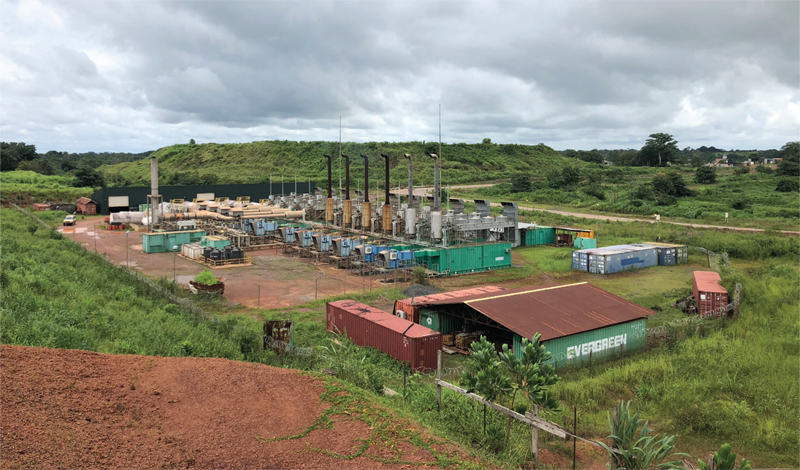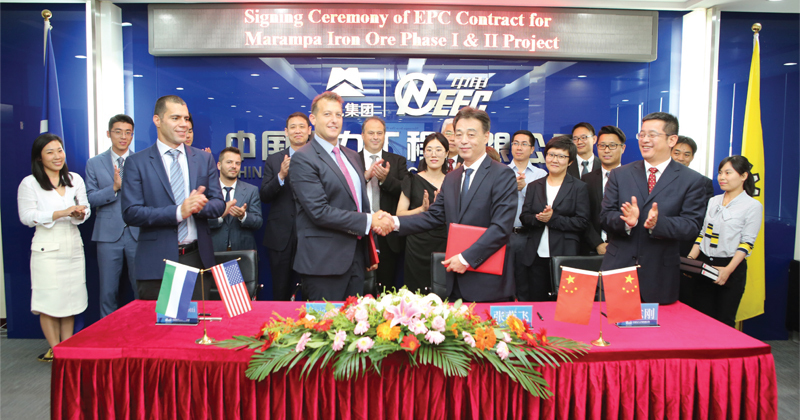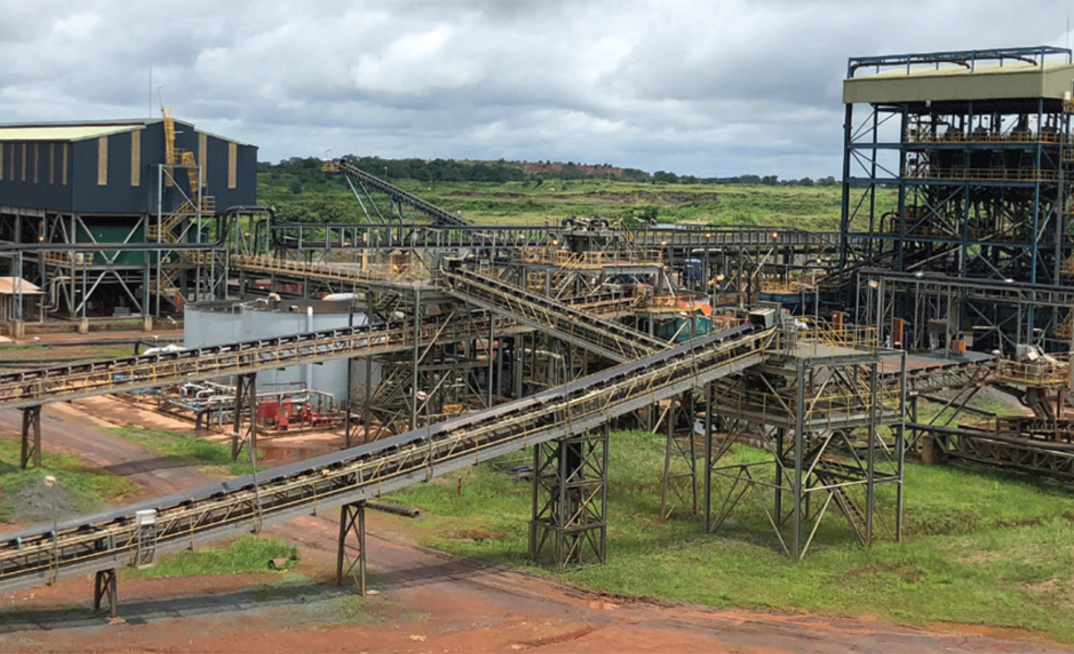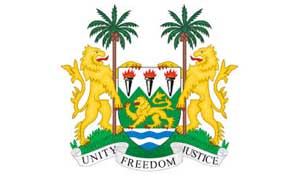The Gerald Group is one of the world's leading private commodity-trading companies. Over the past 55 years, Gerald has developed a successful track record in the physical merchanting, development, trade and financing of commodities and commodity-linked assets, with annual turnover greater than US$8 billion and assets exceeding US$2 billion across an expansive global footprint.
In addition to the robust trading business, historically focused on base and precious metals, Gerald has developed an investment platform over the past several years to gain access to strategic offtake to feed its trading business.
Gerald has leveraged its experience and vast network within the metals and mining sector with technical expertise and operational capability, which has deployed in excess of US$3 billion of financing into mines, refining facilities and logistics assets across the world. The group's investment capability spans a variety of transactions across various production stages and jurisdictions.
Gerald has a successful track record in developing early stage assets and bringing them into production. It brought the Soremi copper-lead-zinc project in the Republic of Congo from early stage exploration to become the first copper cathode producer in the country's history and continue to expand it with its strategic partner, China Gold.
The team brings technical expertise, capital and strong strategic partners.
In Russia, Gerald provided seed capital to Russian Copper Company, to bring the Mikheevsky Copper project from early stage development into production, and now expansion, as one of the largest copper projects in the region.
Other current assets include the Bisie Tin project in the Democratic Republic of the Congo, and the publicly listed Taiwanese precious metals refiner Solar Applied Materials. Although each project is unrelated, each structured investment is expected to provide Gerald's trading arm guaranteed offtake for years into the future. Another landmark transaction was Gerald's funding of the construction of Tiger Resources Copper Cathode plant in the DRC.

The Marampa project power plant, which will need complete overhaul before restart
Marampa
SL Mining Ltd, a limited liability company incorporated in Sierra Leone, is a wholly owned subsidiary of Gerald engaged in the exploration, development and production of iron ore concentrate. Its project is located in Marampa in the Port Loko District, the northern province of Sierra Leone.
SL Mining was awarded a renewable Large Scale Mining Licence (ML) granted under the Mines and Minerals Act, 2009 on March 2017 for a term of 25 years. The ML covers the surface area that was once granted to London Mining plc and is better known as the Marampa project.
During 2017, SL Mining successfully negotiated a Mining License Agreement (MLA) which provides economic stability and international protections that was ultimately ratified by the government of Sierra Leone parliament on December 6, 2017. The government understands the importance of foreign investment and once SL Mining demonstrated its commitment and capabilities, all governmental formalities were completed in order to ensure the Marampa mining project could get back into production as quickly as possible on a sustained basis.
SL Mining is working on rehabilitating and reconfiguring the project for a planned production restart at the end of calendar year 2018. The total resource of the project is estimated at one billion tonnes of iron ore grading 32% Fe, with potential to expand the resource. The historical project includes three production assets, now obsolete, and associated infrastructure built by London Mining between 2011 and 2014.
With the commitment to spend approximately US$300 million to bring this defunct project into production with sustained output of 6.5 million tonnes per annum of highgrade concentrate grading higher than 65% Fe, SL Mining's investment will lead to material job creation in Sierra Leone as well as other direct benefits to surrounding communities and much needed revenues for the government.
History and operational turnaround
Gerald initially became involved in the Marampa mining project in November 2014 when it provided a large structured offtake credit facility to Timis Mining Corporation (SL) Limited (TMC), to ensure continuity of operations after London Mining went into administration and the Marampa mining project was transferred to TMC. However, the Marampa mining project never had the opportunity to perform as intended and shut down in March 2015, only months after TMC took over the project.
"After we lent the money, the plant performance failed and never managed to produce the grade we were looking for," recalls Craig Dean, CEO of Gerald Metals. This comingled with extremely challenging market conditions, the world's worst Ebola outbreak, and lack of viable transport for its product.
The Marampa project has a history of shutdowns. The mine was originally exploited by Delco, then London Mining, and finally TMC.
The iron ore industry is also not one to enter lightly as four producers control 80% of the cost curve, with an ability to ramp up at will, giving this oligopoly a major influence on prices. A smaller-scale iron ore project that does not contain high-grade (>65% Fe) concentrate is destined for failure in the current market conditions, as the current market and forecasts dictate materially higher premium levels for quality product.
So the Gerald team had to redesign and reconfigure the previous project for future success.
"When TMC shut down, we had a major problem," says Gerald's head of operations for SL Mining.
"We stepped into a country that just got struck with the world's worst Ebola outbreak, and had to deal with an asset that never really performed and had exhausted its tailing feedstock.
"TMC also had significant project finance debt overhang that rolled over from London Mining to TMC as part of the deal TMC negotiated at that time. All those factors, including the massive historical debt, a project that could not produce >65% Fe grade, and a plant that would become obsolete the minute it would exhaust its tailing resources, was doomed to fail. It appears as if the previous project sponsors, London Mining, TMC, and the banks all depended on iron ore prices, which today we know was not a good strategy especially when prices collapsed from above US$100 per tonne to less than US$40 in 2015 and 2016."
When Gerald became involved on the ground in 2015, the sight was not pretty.
"It was gloom and doom at some many levels, and not just with iron ore prices in the sub-US$40/t. It was clear that other than Gerald nobody wanted to deal with the Marampa core issue that it was a project that failed once more, had no foreseeable prospect and yet required immediate care and maintenance funding to maintain security and integrity on site."
Gerald was the only project stake holder willing to deploy these significant sums of money in a depressed iron ore market, which would give hope to the local community, retain local jobs, and provide a glimmer of hope that this three-times failed project may have a future if under the right project management team.
Once approached by the previous stakeholders for Gerald to fund, Gerald immediately put a plan in motion, starting with protecting and maintaining the project assets, which can quickly degrade in a harsh tropical environment and therefore need to be preserved for a hope of a restart.
So in April 2015, following plant shutdown, Gerald started to fund a care and maintenance programme in order to try to safeguard its investment into TMC and ensure that the Marampa mining project could be restarted in the future. The company has always believed there was an important social aspect in that the Marampa mining project once employed thousands of local people and the Sierra Leone government would support a "new" investor who had a viable plan of restart and ensure protection of the project site to generate current and future employment.
Gerald was well advanced in a detailed due diligence programme and analysed every technical and operational report, consulted with former project employees, reviewed cost scenarios, and thoroughly reviewed the plant to establish what conditions and configurations were needed for the Marampa mining project to be able to restart.
With a thorough review of equipment on site, supplemented by engineering test work, the Gerald team identified a viable configuration whereby new equipment would be brought in and the flowsheet would be rearranged in order for the plant to produce from a run of mine a true high grade concentrate to be called "Marampa Blue".
"We were able to define a configuration that needed six months rehabilitation and construction time and a manageable investment programme to produce two million dry tonnes per annum of high-grade concentrate which will achieve plus-65% Fe," Craig says.
"This initial phase will then be used as a stepping stone to build the second and larger phase."
Without this phased out approach, the project would have required 30 months for design, funding and construction. So it was a win-win plan for Gerald and the government, with a quick path to job and revenue creation for the country.
Restructuring
While Gerald worked heavily on the turnaround plan, between London and South Africa, the group also focused on trying to ensure a proper financial restructuring of the project.
It attempted to work with TMC's lenders and other stakeholders with a view to reaching a commercial solution to ensure the future of the Marampa mining project, but no agreement was ever reached.
Following the government's cancellation of TMC's mining licenses, Gerald's whollyowned subsidiary, SL Mining, applied for and received in March of 2017, a new large-scale mining licence covering a similar area as the previous Marampa mining project.
SL Mining was awarded the licence following the application process, which included a viable plan for a quick restart and substantial due diligence on the Marampa mining project, and is now the sole operator of the Marampa mining project holding the ML, MLA and land leases and which is now a debt free, unleveraged project.
The plant and equipment, however, was still owned by TMC. But in July 2017, the Sierra Leone government, through the National Minerals Agency (NMA), invoked Section 54 of the Sierra Leonean Mines and Minerals Act, 2009 (ACT) by issuing a certificate to TMC. The government had been very transparent with all stakeholders of TMC and secured lenders that it would enact section 54 if the previous owner did not reach a deal with SL Mining on the existing plant facilities.
According to section 54, when a project owner loses its mining licence, it is required to remove its plant and equipment from the site. In turn, the NMA, if it deems such assets necessary for the project care and maintenance, can elect to refuse such removal by issuing a certificate and pay "reasonable compensation" to the asset owner. Once the certificate is issued, the new mining licence holder, SL Mining, effectively becomes the new title holder of the assets with obligation to reimburse the government when the payment of the "reasonable compensation" takes place.
The Sierra Leone government, and separately SL Mining, engaged independent third party consultants to perform a valuation in accordance with the ACT and estimate a value for the "reasonable compensation". This estimate came within a range of US$4 million to US$16 million and the government is now in the process of finalising its process.

Signing of EPC Contract with CNEEC on June 28, 2018, in Beijing by the Group CEO Craig Dean and Senior Vice President Frederic Lotti for Gerald, and by President Zhang Yanfei and General Manager Li Zhigang for CNEEC
With TMC's mining licence cancelled, loss of land lease rights, and with section 54 invoked, all project stakeholders, including Gerald, incurred substantial losses from the failure of London Mining and TMC. But the process followed by the Sierra Leone government was legally thorough and very systematic and will withstand potential legal challenges it may face from the previous project sponsors.
"Overall and throughout this process, we were very impressed by the GOSL and the local community leaders," Craig says.
"Reviving and creating a sustainable Marampa mining project was always their top priority and all their decisions were based on this principle and nothing else.
"They put Gerald through a very high level of scrutiny at the technical, financial and fiscal level regarding the restart plan and operation. We have a lot of experience dealing with governments in Africa and we've rarely seen anything like this. The government of Sierra Leone and the community leaders were highly demanding project stakeholders and we had a lot of respect for this."
Today and the future
SL Mining has concluded an agreement with a Chinese state-owned enterprise to work on the engineering, procurement and financing of the project.
In June 2018, CNEEC (China Electrical Engineering Corp), Gerald, and SL Mining concluded an EPC and finance contract for the construction of both phases of the project for an overall investment programme of approximately US$300 million.
SL Mining's plan has been to commission this mine by the end of 2018, and executing this agreement helps ensure this goal will be achieved. All of this was completed while there was a change in government from the ruling APC party to SLPP under the leadership of Julius Maada Bio, the president of the Republic of Sierra Leone.
"Gerald has only been welcomed by His Excellency and we look forward to full government support as we bring this project back into production. His Excellency has made key supporting statements to reassure SL Mining that his number one priority is the creation of local employment and a new revenue stream," Craig says.
In the first phase, the project will directly and indirectly create more than 1,000 jobs, increasing in the second phase to 2,000 people. SL Mining aims to source at least 90% of its staff locally, a highly improved ratio compared to London Mining's, and to implement a robust training programme for its workers.
Community
SL Mining recognises that engaging stakeholders is crucial to the success of every project and implemented a number of initiatives to improve the lives of the community stakeholders.
For example, while negotiating the MLA with the Sierra Leone government, SL Mining agreed to increase the royalty payment to the hosting community above the level historically paid by London Mining and TMC.
SL Mining's involvement goes beyond its monetary obligations, with commitment to prioritise hiring of nationals in its work force.
In 2018, about 150 local villagers were hired to build fire belts and road repairs. In addition, about 300 nationals are currently on SL Mining's labour force, which is expected to double by year end.
An information centre in Lunsar was also set up by SL Mining in September 2017 to facilitate an exchange and grievance system.
Some of the key community initiatives that SLM is working on include supporting construction of local primary schools, road and drainage rehabilitation, training, construction of water boreholes and pumping systems, and hosting of community events such as a SL Miningsponsored football league.
Gerald Group - at a glance
Revenue: c$10 billion pa
|
ABOUT THIS COMPANY
Sierra Leone
- A country rich in natural resources
- Iron-ore mining operations have resumed
- Diamond production ongoing from three kimberlite pipes
- Primary gold exploration at an advanced stage
HEAD OFFICE:
- Address: NMA Headquarter, New England Ville, Freetown
- Phone: 00232-79-250702
- Email: info@nma.gov.sl
- Web: www.nma.gov.sl/





























